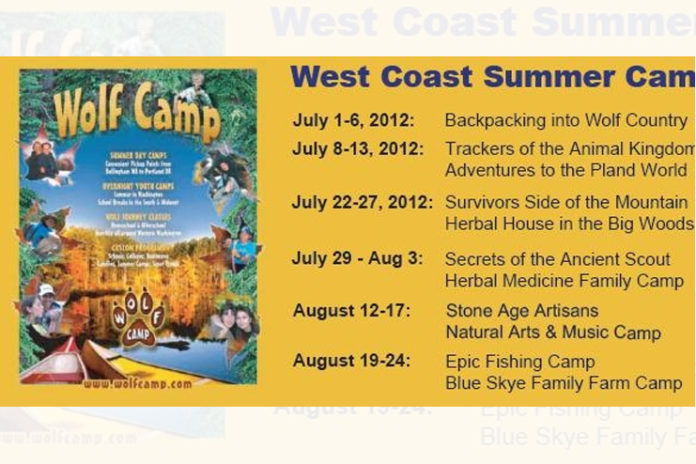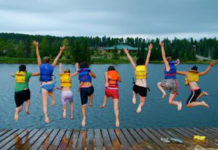Some children relish every moment they are away from home, exercising their independence. But for many, homesickness is an issue whether they admit to it or not. I never admitted being homesick as a child, because that didn’t describe what I was feeling. I was just plain lonely, and unable to connect well with people away from home, probably because my family didn’t operate on an emotional level, so I never opened up about how I was feeling.
But with the help of people I met, going away from home helped me learn how to express my true self and how to let others get emotionally close to me. That’s the real beauty of Summer Camp for me: seeing kids grow emotionally. The games, the art, and the outdoor skills that children learn are super, yet the essence of the camp experience is maturity that the children gain through comraderies with other campers and counselors who are committed to the same challenging situations they are. To find the best camp for your child, and to prepare for the emotional challenges that he or she should find there, research the many choices which are available and take care to ensure that the camp activities are appropriate. If your child isn’t comfortable staying overnight with a friend, or hasn’t spent a few nights away from home before, don’t have him or her start with an extended overnight camp unless you can be allowed to also spend the night if necessary. Think about whether your child is ready for t h e physical, social, mental, a n demotional challenges they need to face, and ask the camp director if he or she truly believes your child will be successful. Ask what kind of training they give their counselors around the issue of boundaries, and what kind of risk management training they receive to prevent problems, and how a balance between challenge and rest. Ask what kind of jokes and stories are told at camp, and how such things are monitored. As you know, the location, cost, and length of stay also must be appropriate. Make sure you are comfortable with the spiritual motivation behind a camp, and investigate its conditions, supervision and safety procedures. And especially in this era of headlines and bullet points, you really need to read the camp website and preparatory materials from beginning to end in order to understand all the information. Here are some specific things you can do with your child once you’ve chosen your camp:
- Discuss with your child in advance what the sleeping arrangements will be like, with whom they will be sleeping;
- Discuss what the daily schedule is, and what happens in case someone gets sick or injured.
- Discuss homesickness and loneliness, and encourage your child to share his or her feelings, and to remember that those the feelings are natural, and that they will pass. It can help to pack a photo or stuffed animal for your child to bring to camp.
- Have your child make a list of concerns or curiosities about camp, then address any questions.
- Show your excitement for what your child is going to learn and experience, and go do an activity together which is similar to something the camp
offers. - Tell your child lovingly but briefly that you are allowing (not sending) him or her to go to camp, that “I will miss you, but I have 100% confidence in you” and in the counselors at camp.
- When your child calls during camp, don’t get into problems at home, and don’t mention fun activities the child may be missing. Instead, just relate your daily home routine, and then ask what the schedule at camp was that day and will be for the next day.
Finally, an important, and often overlooked, aspect to camp is a healthy form of integration after returning home. Campers may be shocked at how they look in he mirror — usually more vibrant if they’ve spent a lot of time outdoors, especially in a wilderness setting. They may not know what to do with themselves after the many days packedfull of constant scheduled activities and continual learning. And they will probably be extremely tired, both physically and emotionally from the demands of camp. Have their favorite meal prepared the day after they return home, and plan extra sleep-in time. Then provide an activity on the day after camp that will help them transition from the constant stimulation of camp, to something active but familiar, such as a sport they enjoy. And most important, give them time to tell you and as many people as possible the stories from their Summer Camp experience. Storytelling is the ultimate form of integration, and it is key to a health camp experience.
Even more, sit down with your children to journal about what it was like coming back from camp, or have them create an art project about it, such as composing a song, writing a poem, or painting a “before and after” picture of themselves. If they want, prominently display any certificates, photos, ribbons, or other memorabilia they received from camp. And above all, tell them how happy you are that you are together again, hug them and say “I love you”.
Chris Chisholm leads every camp week of the summer with his wife Kim, sharing skills and stories of the Naturalist, Tracker, Herbalist, Scout, Hunter, Artisan & Pioneer. Check out www.wolfcamp.com
July 1-6, 2012: Backpacking into Wolf Country;
July 8-13, 2012: Trackers of the Animal Kingdom Adventures to the Pland World;
July 22-27, 2012: Survivors Side of the Mountain Herbal House in the Big Woods
July 29 – Aug 3: Secrets of the Ancient Scout Herbal Medicine Family Camp
August 12-17: Stone Age Artisans Natural Arts & Music Camp
August 19-24: Epic Fishing Camp Blue Skye Family Farm Camp
November 2 0-25, 2012 : Mississippi Delta & Gulf Coast cology starting in New Orleans West Coast Summer Camps
Holiday Teen & Family Camps around the US:
Dec 26-31, 2012 : Winter with the Wolves in the north woods of Wisconsin
Feb 17-22, 2013 : Mojave Desert Tracking, Birding, Plants & Survival near Los Angeles
Mar 24-29, 2013 : Birds & Buds of Dunes & Canyonlands in Washington & Oregon









